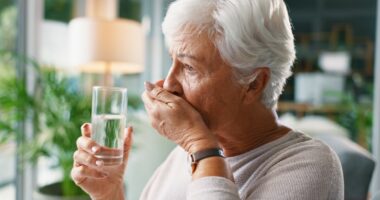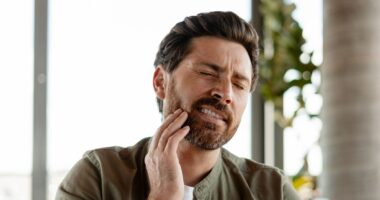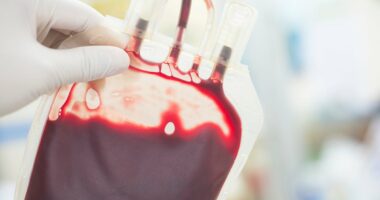Share this @internewscast.com
According to a recent study, tens of millions of Americans who suffer from sleep disorders are at an increased risk of developing severe neurological conditions.
Sleep apnea, which impacts around 30 million people in the U.S., is characterized by repeated interruptions in breathing during sleep. Those affected often experience brief choking episodes as their throat muscles relax and obstruct their airways.
Among those with sleep apnea—marked by loud snoring and daytime fatigue due to disrupted sleep cycles—80% remain undiagnosed and may be unaware of their condition.
The latest research examined 1.5 million veterans diagnosed with obstructive sleep apnea (OSA) and discovered they faced nearly double the risk of developing neurological disorders compared to those without OSA. However, veterans who used CPAP machines to aid breathing significantly reduced their risk by more than one-third.
Dr. Lee Neilson, the study’s lead author and a neurologist at Oregon Health & Science University, explained, “When breathing stops and oxygen levels drop, neuronal function is likely impaired. This ongoing nightly disruption may contribute to neurodegenerative diseases, such as Parkinson’s.”
Dr. Neilson added, “By using CPAP to address these breathing issues, patients may build resilience against these conditions over time.”
Parkinson’s disease ravages the brain’s dopamine system, which, in addition to managing the body’s reward pathway, governs involuntary movements and motor control. It afflicts roughly one million Americans.
It causes motor symptoms like tremors, often starting in the hands and limbs on one side of the body, slowness of movement, stiffness, and balance issues, as well as non-motor symptoms such as loss of smell, constipation, sleep disorders and depression.

Roughly one million seniors have Parkinson’s disease, which affects people’s movements, balance and ability to walk as time goes on (stock)
Researchers at Oregon Health & Science University and the Portland VA Health Care System examined the electronic health records of more than 11 million US military veterans who received care between 1999 and 2022.
They screened 13.7 million veterans with an average age of 60. Of that total, 1.5 million had been diagnosed with OSA.
Veterans with diagnosed OSA had a 1.61 times higher risk of being diagnosed with Parkinson’s disease within six years compared to those without the condition.
Variations in breathing while sleeping mean the brain does not get enough oxygen, which damages chemical messengers in the brain.
This can happen hundreds of times a night, every night, for years.
Dr Gregory Scott, a pathologist in the OHSU School of Medicine and the Veterans Affairs hospital in Portland, said: ‘It’s not at all a guarantee that you’re going to get Parkinson’s, but it significantly increases the chances.’
Treatment with a device called a CPAP, which feeds oxygen into the airways and keeps them open to prevent breathing interruptions and frequent wake-ups, was a powerful shield against that neural damage, though.
Those who were treated with a CPAP machine had a significant 31 percent reduced risk of Parkinson’s compared to those who were untreated for their OSA.
![The graph shows the risk of developing Parkinson's disease in people with and without OSA. The group with OSA [blue] had a greater number of new Parkinson's diagnoses over a six-year follow-up period compared to the group without OSA [orange]](https://i.dailymail.co.uk/1s/2025/11/24/16/104144729-15321331-The_graph_shows_risk_of_developing_Parkinson_s_disease_in_people-a-1_1764000028417.jpg)
The graph shows the risk of developing Parkinson’s disease in people with and without OSA. The group with OSA [blue] had a greater number of new Parkinson’s diagnoses over a six-year follow-up period compared to the group without OSA [orange]

Patients who started using CPAP within two years of their sleep apnea diagnosis had a markedly lower risk of getting Parkinson’s later on than people with no CPAP
Neilson said: ‘The veterans who use their CPAP love it.
‘They’re telling other people about it. They feel better, they’re less tired. Perhaps if others know about this reduction in risk of Parkinson’s disease, it will further convince people with sleep apnea to give CPAP a try.’
Sleep apnea rates are expected to see a rise due to historic obesity rates, inactive lifestyles and an older population. The condition is already most common among adults over 65, accounting for more than half of sufferers.
One study published in August suggested that the burden of sleep apnea in the US is actually far higher than 30 million: 57 million.
Researchers estimated that, by 2050, that figure will have surpassed 76 million, a 34 percent rise.
About 90,000 Americans are diagnosed with Parkinson’s every year, and cases are expected to see a parallel surge in the next 25 years as the US population ages and continues to skew older.
A 2021 research project published in the British Medical Journal projected that cases will exceed 25 million by 2050, an increase of 76 percent from 2021.
The study pointed not only to an aging population, but also to environmental pollution, particularly ozone and nitrogen dioxide, exposure to pesticides, climate change and different lifestyle factors like sedentary lifestyle and unhealthy diets.
The study found that changing one’s lifestyle would drastically reduce one’s risk. Researchers estimated that if everyone exercised several times a week, it could eliminate about five percent of Parkinson’s disease worldwide.
Their research was published in the journal JAMA Neurology.















